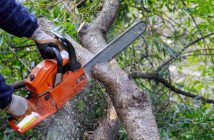While wildlife conservationists fight back against poachers, tree huggers have a fight of their very own. Tree poaching—the act of illegally cutting down a tree, usually for sale on the lumber black market—is on the rise. Conservation non-profit Adventure Scientists plans to change that by using science to thwart tree thievery with the Timber Tracking Project.
Much like crime scene investigators using DNA to track down suspects, Adventure Scientists, including advisory board member Bo Parfet, have been working together on this project involving volunteers enlisted to collect tree DNA samples to prevent timber poaching.
Although it might sound hokey, the field recently scored a historic win. Bigleaf maple DNA samples collected in the Pacific Northwest recently led to the July 8 federal conviction of a tree poacher. The case focused on the 2018 Olympic National Forest fire which burned 3,300 acres to a crisp. When firefighters responded, they noticed that several stumps had been illegally chopped and sounded the alarm to the conservation group.
The defendant now faces up to 10 years in prison.
The revolutionary Timber Tracking Project could indeed change how federal courts deal with timber poaching cases—forever.
How To Catch a Timber Poacher
To make that hard-won conviction happen, Dr. Richard Cronn, a research geneticist with the U.S. Department of Agriculture (USDA) Forest Service, and his team worked tirelessly to collect big leaf maple tree samples in the surrounding area. The researcher testified that the DNA samples his team had taken matched the type of wood the defendant had been selling.
“When people steal trees from our public lands, they are stealing a beautiful and irreplaceable resource from all of us and from future generations,” Acting U.S. Attorney Tessa M. Gorman said in a statement. “That theft, coupled with the sheer destruction of the forest fire that resulted from this activity, warrants federal criminal prosecution. I commend the various branches of the U.S. Forest Service who worked diligently to investigate and hold this defendant accountable.”
Cronn’s landmark work sparked the partnership with Adventure Scientists and birthed the Timber Tracking Project. The initiative has since led experts to collect thousands of leaf, seed, and wood samples in order to create a large-scale database of genetic signatures of tree species across the United States. The project will support new, innovative tools that can identify the origin of any timber, which experts may use in criminal cases.
Keeping a Watchful Eye on the Eastern Black Walnut Tree
The Eastern black walnut tree is continuously under threat from timber poachers because it is one of the most valuable hardwood species in the U.S. It joins the endangered likes of the bigleaf maple, coast redwood, western red cedar, and Alaska yellow-cedar. The Adventure Scientists’ volunteers are currently cataloging samples from the prized walnut tree, and law enforcement will have regular access to the data so that they can use it as part of any live investigations into timber poaching.
Volunteering With Adventure Scientists
None of this research would be possible without Adventure Scientists’ volunteers. These outdoor adventurers bring their varied skills to help collect samples from all around the country. It’s all in a hard day of (leisurely) work. The volunteers collect samples for the Timber Tracking Project while engaging in outdoor activities like skiing, rock climbing, hiking, and mountain biking. Samples are processed in two ways: mass spectrometry-data analysis in real-time (MS-DART or DART) and genetic analysis. Data are then made available to prosecutors and courts through various federal databases.
How Bo Parfet Joined Adventure Scientists
Adventure Scientists brought Bo Parfet onto its advisory board of directors in 2020, and it’s hardly an unlikely pairing. Although Parfet is known to have a background in finance—he graduated with an MBA from The Kellogg School of Management at Northwestern University and worked as an investment banker in corporate finance for J.P. Morgan—he’s the consummate outdoorsman. While working on Wall Street, he embarked on an around-the-world trek to climb the highest mountain on every continent. He is now one of only 127 people in the United States to have scaled the Seven Summits. It’s no wonder that Parfet would gravitate to an outdoorsy and eco-focused organization like Adventure Scientists.
“It’s an honor and a privilege to serve this great organization,” said Bo Parfet. “Adventure Scientists is at the cutting edge of helping humanity develop a healthier relationship with the earth and the miracles it provides us.”



